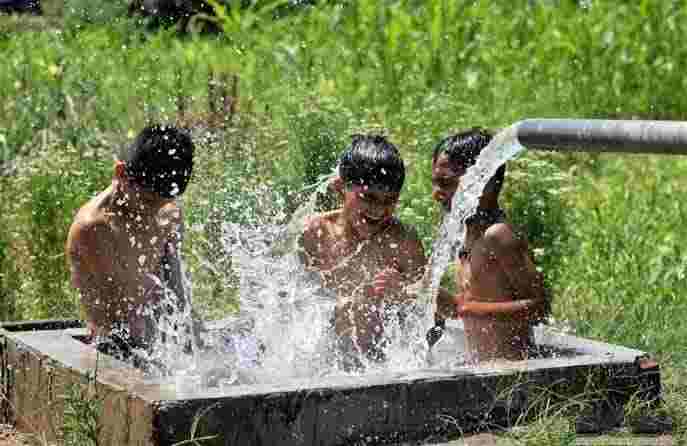Severe heat wave grips Kashmir, courtesy climate change
Erratic weather conditions outcome of climate change, says expert; prolonged dry spell led to prevalent weather conditions, says MeT; Sgr among 3 Kashmir parts surpass decades old day temperature; some relief expected after Sep 15
Owais Gul
Srinagar, Sep 12 (KNO): Owing to the climate change in Kashmir, the prolonged dry spell in Jammu and Kashmir parts has presently resulted in severe heat wave conditions, breaking the decades old records in the month of September here in the Union Territory.
With no active Monsoon activity and also the absence of the Western Disturbance, there has been a sudden increase in the maximum temperature across Jammu and Kashmir, Deputy Director Meteorological department (MeT) told the news agency—Kashmir News Observer (KNO).
The experts have stated that the prevalent weather conditions are the outcome of climate change. “The main driver of this sudden change in weather conditions is climate change. There is a possibility of erratic weather conditions due to climate change. In that context, snowfall was recorded in the month of November in 2018-19, which is due to climate change. So the present heat wave is also a part of the erratic weather conditions,” Dr Irfan Rashid, an expert told KNO.
“In the ensuing autumn, Kashmir may witness different kinds of weather events that will follow as a part of ongoing regional climate change, which Kashmir is experiencing,” Dr Irfan Rashid added.
He further stated that the weather system might have weakened, which has led to the prolonged dry spell, but it needs to be researched properly meteorologically.
About climate change, he said that the people at present mostly rely on conventional fossil fuel, which led to the increase in regional emissions. “The governments as well as the policy makers need to look into it, which can reduce the carbon footprint and can help somehow to tackle the situation,” he added.
Deputy Director MeT, Dr Mukhar Ahmad told KNO the present heat wave is the outcome of prolonged dry spell, saying that there was no active Monsoon activity and also the absence of Western Disturbances have led to the present weather conditions.
“The present heat wave conditions will continue for the next one week. There is a forecast of hot and dry weather conditions till September 15, following which the weather conditions would improve,” he said.
Moreover, Srinagar once again recorded the hottest day in the month of September. According to the Independent Weather Forecaster, Faizan Arif Keng, Srinagar has recorded the second highest maximum temperature in the month of September since 1891.
The maximum temperature in Srinagar settled at 34.2 degree Celsius, which is 6.0 degree Celsius above normal.
The previous record was 33.8 degree Celsius on 01 September 1970 while the all-time record was 35.0 degree Celsius on 18 September 1934, Keng informed.
Moreover, Kokernag and Qazigund continued to witness severe heat wave conditions as the mercury settled 6.6 degree Celsius and 6.7 degree Celsius above normal respectively.
In Qazigund, the maximum temperature settled at 33.2 degree Celsius, he said, adding that the previous record was 32.8 degree Celsius on 12 September 2019 while the all-time record is 33.2 degree Celsius.
As per Keng, the maximum temperature in Kokernag settled at 32.0 degree Celsius, which is also similar to the all-time hottest day in September recorded in September 1977 while the previous record was 31.8 degree Celsius on 02 September 2023—(KNO)





